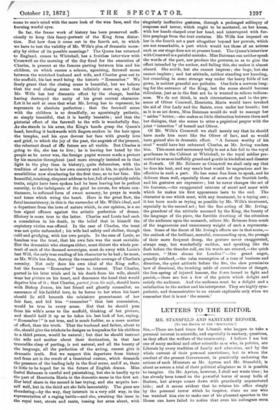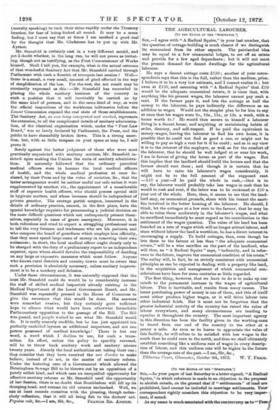LETTERS TO THE EDITOR.
MR. STANSFELD AND SANITARY REFORM.
(TO THE EDITOR OF THE "SPECTATOR.") Sra,—These are bard times for Liberals who happen to take a personal interest in scientific, and especially in sanitary, questions, as they affect the welfare of the community. I believe I am but one of many medical and other scientific men who, in politics, are Liberals by every tradition of family and education, and by the whole current of their personal convictions, but to whom the conduct of the present Government, in practically endorsing the actions of such Ministers as Mr. Ayrtou and Mr. Stansfeld, is about as severe a trial of their political allegiance as it is possible to imagine. On Mr. Ayrton, however, 1 shall not waste time ; he has already been tossed on the powerful horns of many bulls of Bashan, but always comes down with practically unpunctured hide ; and it seems evident that he retains his office simply by the personal terror which he inspires, since no one who has watched him rise to make one of his pleasant speeches in the House can have failed to notice that even his colleagues seem
(morally-speaking) to tuck their shins rapidly under the Treasury benches, for fear of being' kicked all round It may be a mean feeling, but I must say that at times- I am soothed a good deal by- the thought that Mr. Gladstone has to put up with Mr. Ayrtom
Mr. Stansfeld is. certainly cast in a very different mould, and yetIdoubt whether, in the long run, he will not prove as irritat- ing, though not as terrifying, as the First Commissioner of Works himself; Shall I tell you, for example, what is the actual outcome of that. wonderful Sanitary Act that Mr. Stansfeld carried through Parliament with such.a flourish of.trumpets last session? Well— there is a small, a very small, amount of good effected' in the way of simplification of the law. For the rest; the net result may be succinctly expressed as this :—Mr. Stansfeld has succeeded in placing the whole sanitary business of the country in suoh a position that it will inevitably be carried on by the same kind' of persons, and in the same kind of way, as were the official inspections of the workhouse infirmaries before the Lancet Commission exposed the real state of those establishments. The Sanitary Aot, as now being interpreted and worked, represents the extension, to all the complicated details of sanitary administra- tion, of the identical organisation which, under the "Poor Law Board," was so lately declared by Parliament, the Press, and the public to have shamefully broken down. This is a strong asser- tion, but, with as little trespass on your space as may be, I will prove it.
Sorely against the better judgment of those who were most practically acquainted with sanitary matters, Mr. Stansfeld in- sisted. upon making the Unions the units of sanitary adrninistra- tioni. It naturally followed that the ordinary parochial medical officers were to become the local medical officers of health, and the whole medical profession at once de- clared, by their Press and by the voice of societies, &c., that the latter arrangement would be neither useful nor safe unless it were supplemented by-another, viz., the appointment of a considerable staff of superior health officers, who should possess special shill in hygienic matters, and whose incomes should be independent of private practice. The average parish surgeon, immersed in the details, of ordinary practice, cannot, in the first- place, have the special knowledge requisite for pronouncing a judicial decision on the more difficult questions which not, unfrequently present them- selves, especially in cases of grave emergency. Moreover, it is both. ridiculous and cruel to expect a straggling professional man to tell the very farmers and tradesmen who are his patients, and who oompose the board of guardians which employs him officially, that they must spend large sums of money in removing their own nuisances; in short, the local medical officer ought clearly only to be charged with the duty of a preliminary report to an independent superior, upon whom should devolve the responsibility of deciding on any large or expensive measures which must follow. Anyone who knows rural districts and country towns must be aware that such a provision is absolutely necessary, unless sanitary improve- ment is to be a mockery and delusion.
Under these circumstances, it was naturally supposed that the least Mr. Stansfeld could do would be to considerably increase the staff of skilled medical inspectors already existing in the Medical Department of the Local Government Board, and Mr. Stansfeld was repeatedly pressed in the House of Commons to give the assurance that this would be done. His answers were somewhat evasive, but they certainly gave sufficient hope to silence what would have been otherwise formidable Parliamentary opposition to the passage of the Bill. The Bill was passed, and people waited to see what Mr. Stansfeld would do. It is really scarcely credible, but he has just appointed ten perfectly unskilled laymen as additional inspectors, and not one person possessed of medical knowledge ! There is but one word, a word which I decline to use, for such a trans- action. Its effect, unless the policy be speedily reversed, will be to throw back sanitary work and sanitary science twenty years. Already the local authorities are taking their cue ; they consider that they have received the mot d'ordre to make believe, instead of to act, in the matter of sanitary reform. Under the fostering care of a Government which allowed the Birmingham Sewage Bill to be thrown out by an opposition of a purely selfish kind, and which uses an unequalled opportunity for effective sanitary reforms as Mr. Stansfeld used the opportunity of last Session, there is no doubt that Bumbledom. will lift up its drooping head, and resume its old courses unchecked. Well, we can at least console ourselves with the pleasing, though melan- choly reflection, that it will all bring fish to the doctors' net.
Populus cult, &o.—I am, Sir, &c., FRANCIS ED. ANSTIL



































 Previous page
Previous page